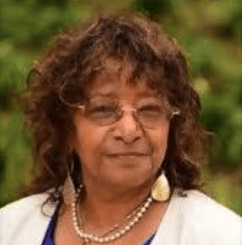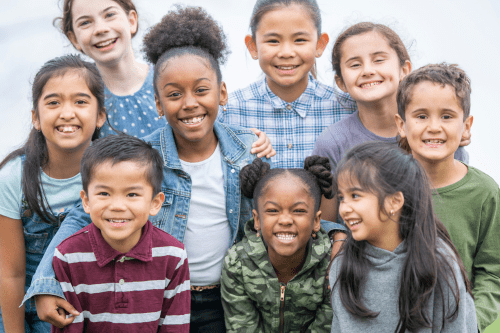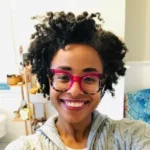Dr. Regina Rodriguez is a graduate of Harvard University Graduate School of Education (administration, planning and social policy research). She also holds a Montessori administrator’s certification from the Barrie Institute for Advanced Montessori Studies in Rockville, MD.
She most recently participated as a national charter collaborative national manati fellow for single-site charter leaders of color. She proudly identifies as Afro-Latina, born in Columbia and raised as a bilingual ‘Native New Yorker’ in Brooklyn, NY. She has also been a proud member of Delta Sigma Theta national sorority for 30+ years. She is also a proud mom, nana-abuela, great aunt, and the human mom of fur baby Miles Davis Rodriguez.
Before being recruited to lead Shining Stars Montessori Academy, Regina Rodriguez had acquired more than 30 years of career experience in a diverse array of teaching and learning environments. She has served as a Peace Corps volunteer and country director; as a policy fellow at the National Education Policy Fellowship Program at George Washington University; as a principal; higher education administrator, and chief academic officer at two multi-campus public charter schools and as cofounder of a PK-K immersion school in Colombia. She later cofounded a public charter high school in Washington, DC.
There are so many leaders of color who are engaged in deep heart work and commitment to Montessori philosophy, many of whom we don’t often see. It has been a pleasure to be in conversation with Dr. Rodriguez about how her passion for education and approach to leadership is informed by her identity. I invite you to take a moment to hear from a BIPOC Montessori leader who leads her small learning community with authenticity, critical consciousness and grace.
Please share with us the significance of Hispanic Heritage Month.
Dr. Regina Rodriguez:
 I have the same feeling about Hispanic Heritage Month as I have about Black History Month. It is not something that should just be observed for 30 days and then we’re done. The mission of Shining Stars is about being culturally inclusive, in everything we do, it is baked into how we walk, talk, and teach. We recognize similarities and differences and appreciate and celebrate folks, and not just tacos in September and chitlins in February. We go much deeper and expose our students to a wide range of cultural experiences.
I have the same feeling about Hispanic Heritage Month as I have about Black History Month. It is not something that should just be observed for 30 days and then we’re done. The mission of Shining Stars is about being culturally inclusive, in everything we do, it is baked into how we walk, talk, and teach. We recognize similarities and differences and appreciate and celebrate folks, and not just tacos in September and chitlins in February. We go much deeper and expose our students to a wide range of cultural experiences.
When I first meet parents and they’re in the building looking for Dr. Rodriguez, oftentimes they walk right past me and approach someone else who looks more like who they’ve seen on the telenovelas. You know, a little bit more Eurocentric looking or a different phenotype. In the D.C. area, there are more Latinos and Latinas from Central America. I am Afro-Latina but it’s also not something that I wear on my sleeve. It is who I am. I don’t necessarily introduce myself that way to people. But it is something I’m very proud of. I also find that I have to explain to European parents, but also to African Americans and even some Latino parents, what it means to be Afro-Latina. I don’t see a presence of Afro-Latinos in Montessori, nor do I see many African-American Montessori teachers or leaders, which is of tremendous dismay to me. We may see some concentration of BIPOC educators and leaders in certain areas, but I don’t see it at all levels. I think the emphasis on diversity in Montessori is late in coming, actually very late.
Celebrating Hispanic heritage is what we’ve done since our first year back in 2010. It’s always been who we are and what we do. We strive to be authentic in our observation, so we don’t just wear full skirts and bolero hats, or color a flag. That’s not what we want to do. We have discussions in class about the wide range of Hispanic people and cultures, and we link that to classroom lessons, activities, and learning standards. Yes, it takes effort, but you have to bake it into the lesson plans and into the units of study, and at the end of each year we look at our observations and fix what’s broken and, if it’s working, we ask how to get better at it.
Please share what informs your leadership practice.
Regina:
I’ve been at Shining Stars for 11 years and this is the first time I’ve been approached by AMS to share my thoughts about my work and my school. From a local, regional, and national level, a particular concern of mine is how we bring Montessori into the public sector. To do this equitably, we must look at who actually is in Montessori, who are the decision-makers, who are the ballers with the loudest voices, and then how that plays in our schools. All of this affects the BIPOC Montessori pipeline, which is another huge issue for me. I have tremendous struggles with securing qualified, certified Montessorians of any race, and finding someone of color is even more of a challenge.
Shining Stars has a dual immersion program and I have had to go abroad to ensure we have a diverse staff. We’ve struggled and don’t receive much support from the Montessori community. Most of our Latino staff instructors are coming from abroad. We’ve created our own Montessori resident program in order to grow our own faculty and then hope that they will remain with us and not be enticed by other schools or systems with more money. This is not just a challenge for an Afro-Latina Head of School. However, for a long time, I was one of only a few Black heads of school and currently the only Afro-Latina. I am used to being an “only”. Leading while Black and leading while Afro-Latina, has forced me to reach out to my other networks. Effective leadership is effective leadership, but sometimes you need the support and comfort from those who look, like you, and have walked a similar path.
I want to figure out how to have some sort of impact locally, but also nationally, and leave a legacy here because I don’t want younger aspiring leaders to have to face the same things that I faced when I started. Much of what I’m saying here is not just unique to Montessori, it’s the things that you’re going to face as a leader of color and of a single-site public charter, it has its challenges. However, we’re also a small school by design so there are some tremendous advantages to that in terms of being able to launch innovations and pivot more than a larger school might not be able to.
“If you talk to a man in a language he understands, that goes to his head. If you talk to him in his language, that goes to his heart.”
– Nelson Mandela
Can you tell us more about your Dual Immersion Program?
Regina:
The dual immersion was not initially part of our charter. But it clearly arose from some of my personal interests as I do believe that bilingualism is a bridge. It is also a way of opening doors that many people see as offering one a competitive economic advantage in the workplace. And while that is part of it, I also think it inspires us to explore and develop a love for diverse groups of people and cultures, which can happen through language.
Latinx people are all part of the global majority, and the world is global. It’s important that we are able to support students in being multilingual. Our parents and caregivers were also asking for it. It’s the nature of the D.M.V. (District, Maryland, Virginia), and so we just slowly did it without permission, we basically decided to do it as a community. With the help of a few colleagues at two other local schools, we now have a growing dual immersion program. It was amazing also in that we challenged ourselves to learn more about second language acquisition and it gave us an opportunity to speak with mono-English families and predominantly Black families that had been historically told you can’t learn another language or math or science for that matter.
I also really work to have a diverse staff. In our dual language immersion program, most of the staff are bilingual at least and some are trilingual and quadrilingual. It is important to note that I also strive to not only have diversity in our academic program but also is important to have it in our school operations and other key staff positions.
The quality of the Spanish language instruction is very important because, even though your last name is Rodriguez, it doesn’t necessarily mean you are able to teach Spanish content. We’ve partnered with the few bilingual Montessori training programs that are available and trained teachers who may have been bilingual but were on a mono-English track. The program is growing and at some point, we hope to have a second campus that serves Pre-K-3 through a children’s house, that is only dual immersion and at some point, expand beyond Spanish
hopefully expanding to French because we have a lot of families that are asking for this. We have a very international community in this area, and so we’re getting a lot of folks asking for that.
Our school has attracted a number of Latino families who would not have initially thought to do Montessori but are also looking at building and maintaining their children’s Spanish language proficiency. I’ve been pleased to know that they are attracted to our program.
Recently we’ve noticed a growing newcomer population. Some call them migrants or immigrants, but this is a diverse group, and we use the term newcomer. This group is growing but also transitory and so we have welcomed those children and their families. They participate in our dual language program and also receive English Language Learner Services. In this way, we’ve been able to promote Montessori Education in a very quiet way and so far, all of those students that enrolled last year have come back.
We’ve seen that much of the core Montessori philosophy, such as learning at your own pace, and the teacher being a guide appeals to our migrant or newcomer families. Many of them have experienced different levels of hardship and honestly, all of our students are at-risk in some way. I think all in all, being Afro-Latina, helps me to connect with a unique kind of appreciation and empathy. But that doesn’t mean that it is not there with others, but it is very much connected to who I am and my lived experiences. And so, the lens is very clear.
Interested in writing a guest post for our blog? Let us know!
The opinions expressed in Montessori Life are those of the authors and do not necessarily represent the position of AMS.


